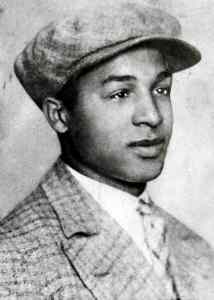Hilarius Gilges – The Black German Communist Who Was Killed For Fighting Against Hitler
Hilarius Gilges is one of the few documented and popular examples of Afro-Germans who actively stood to oppose the rise of Hitler’s Nazism in Germany before the onset of World II. While combatting the ideological flaws of Nazism, Gilges was also a victim of racial prejudice. Hilarius Gilges was killed at the age of 24.
Hilarius Gilges was born in Düsseldorf on April 28, 1909 (some sources say March 4, 1909). His Mother Maria Stüttgen was a textile worker in Dusseldorf. The origin of his biological father is not clearly defined. Some historians say he was a black man. However, it is believed that one of his parents emerged from one of Germany’s African colonies. When Maria married a native German, he gave Hilarius the family surname, Gilges.
Black people existed at the time though in a small number. Many of them were a result of relationships between white women and men who had travelled to Germany from its few African colonies. To say Blacks were the primary targets of German racism is entirely false. Nevertheless, they were tagged with derogatory names like “Rhineland bastards”. A popular picture postcard from the time mocks them under the slogan, “Brutality, Bestiality, Equality”—a twisted echo of the French slogan “Liberty, Equality, Fraternity”.
Growing up, there were scenarios where Gilges faced racial insults and discrimination. It was these experiences that drew his attention to communism. He was attracted to the ideology because of its egalitarian aspects. In 1925, at age 17, Gilges joined the Young Communist League of Germany, the youth wing of the Communist Party. He also became an amateur actor with the communist agitprop theatre group “Nordwest ran” in 1930. The Nordwest Ran employed a mobile stage where actors and musicians conveyed to the public the benefits of revolutionary, scientific socialism and why they should ignore the bigotry and inhumanity of Nazism. As the Nazi threat expanded, Gilges and his friends were compelled to embark on more street demonstrations and protests. In 1931, Gilges was lured into a fight with right-wing racists and was arrested by police sympathetic to his attackers. A Düsseldorf court sentenced him to a year in prison. Upon his release in 1932, Gilges travelled the lower Rhine region warning people in numerous settlements about the evils of Nazism and Adolf Hitler. By this time, Hilarius was popular, inspiring his enemies to speedily plan for his death. Regardless, Gilges furthered his anti-Nazism agendas.
On January 1933 when the Nazis came to power, Gilges was forced to take his activism covertly underground. Gestapos toured the working class areas hunting down communists who dwelled there. Hilarius was aware that danger was looming but couldn’t go into total hiding because he also had a wife (Katharina Hubertine Laatsch) and two children to consider. If he had also tried to escape, his skin colour would have given him away.
On the night of June 20, 1933, a bang came at his door around 10 pm. The Nazi Gestapo, with a dozen SS soldiers, barked and cheered, knowing they had captured their target. Gilges was dragged out of his flat in the Altstadt district of Dusseldorf, Germany, in front of his wife and child. He was taken to jail and where he was excessively tortured by the Nazis.
Hilarius Gilges was stabbed 37 times, his arms were dislocated, and he was shot in the head. His body was then dumped into the Rhine River. Gilges’s daughter Franziska recalls the night he was finally captured. “My father was grabbed in front of my eyes,” she said. “Twelve big SS officers dragged him out of the house. The next time I saw him was here [the river Rhine in Dusseldorf], floating under the bridge. He’d been stabbed 37 times and shot through the head.”
Gilges’s killers are said to have been six members of the Gestapo and SS. After the Nazi disestablishment, none of them was tried in court. The Nazis believed that killing him would impact their anti-Communist strides and racial purity plans.
On 23 December 2003 the city of Düsseldorf named a plaza after Hilarius Gilges, in the vicinity of the Düsseldorf Academy of Arts. In 1988 a plaque had been already placed at the approximate site of the murder.




